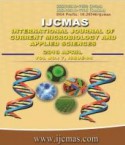


 National Academy of Agricultural Sciences (NAAS)
National Academy of Agricultural Sciences (NAAS)

|
PRINT ISSN : 2319-7692
Online ISSN : 2319-7706 Issues : 12 per year Publisher : Excellent Publishers Email : editorijcmas@gmail.com / submit@ijcmas.com Editor-in-chief: Dr.M.Prakash Index Copernicus ICV 2018: 95.39 NAAS RATING 2020: 5.38 |
The worldwide spread of carbapenem-resistant Enterobacteriaceae (CRE) has become a major challenge in healthcare settings. This study aimed to screen the susceptibility to imipenem and meropenem, among 49 Klebsiella and 7 Proteus vulgaris clinical isolates from Egypt. The combinations of carbapenems with ciprofloxacin, rifampicin, amikacin and colistin were tested against CRE. Attempts to cure plasmids mediating carbapenem resistance using menthol, as a natural curing agent, as well as to test its efficacy when combined with other antibiotics against CRE, were done. A comparison was done between phenotypic methods and polymerase chain reaction for the differentiation of carbapenemases. Among our isolates, 80.36 and 843.93% were resistant to imipenem and meropenem, respectively. The tested carabpenem/antibiotic combinations proved their efficacy against CRE. Menthol showed good curing rates (up to 100%) for carbapenem resistance plasmids. Also, in 71.43% of the studied cases, it improved the efficacy of the tested combinations. Polymerase chain reaction was more precise for the detection of carbapenemases. Among the tested isolates, blaNDM and blaOXA-48-like were the most prevalent carbapenemases. Our results demonstrated that carbapenem resistant Klebsiella and Proteus vulgaris clinical isolates have become a serious threat in Egypt. Combination therapy including menthol was the most appropriate for combating CRE.
 |
 |
 |
 |
 |